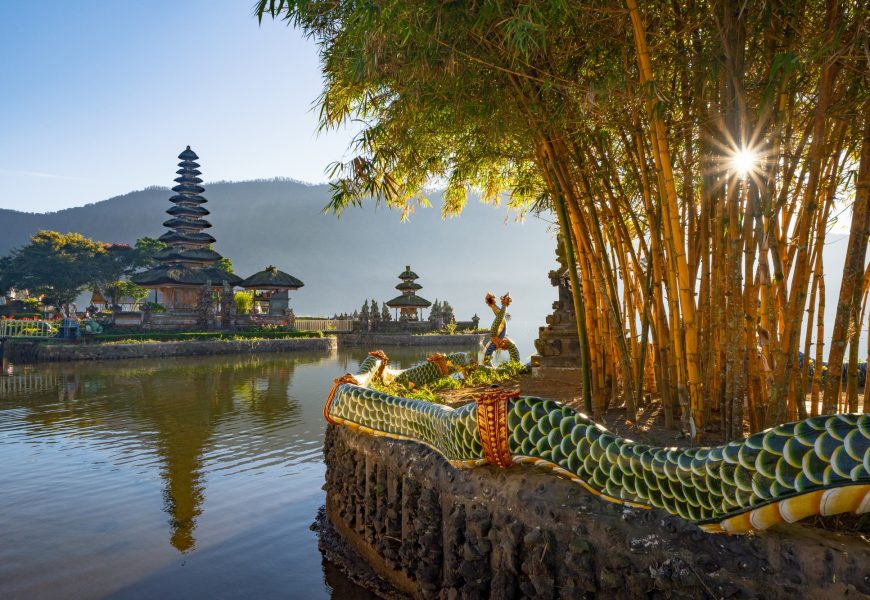Indonesia, the world’s largest archipelago, comprises over 17,000 islands stretching across the equator, offering a rich tapestry of cultures, landscapes, and experiences. From the vibrant arts scene in Ubud to the pristine beaches of the Gili Islands, Indonesia caters to every traveler’s dream.
Regions and Highlights
Bali: Renowned for its lush rice terraces, ancient Hindu temples, and vibrant arts scene, Bali is a haven for those seeking both relaxation and cultural immersion. Ubud, often considered the cultural heart of Bali, offers traditional dance performances, art galleries, and crafts markets.
Java: Home to the bustling capital, Jakarta, and the cultural hub, Yogyakarta, Java is rich in history and heritage. Yogyakarta provides access to the majestic Borobudur and Prambanan temples, showcasing intricate ancient architecture.
Sumatra: This vast island boasts diverse wildlife, including the critically endangered Sumatran orangutans. The lush rainforests and volcanic landscapes offer adventurous trekking opportunities.
Komodo National Park: Encompassing the islands of Komodo, Rinca, and Padar, this UNESCO World Heritage site is the natural habitat of the Komodo dragon, the world’s largest lizard. The park also features rugged hills and savannahs, providing a unique backdrop for exploration.
Raja Ampat: Located in West Papua, Raja Ampat is famed for its marine biodiversity, making it a premier destination for diving and snorkeling enthusiasts. The archipelago’s crystal-clear waters and vibrant coral reefs are home to a plethora of marine species.
Cultural Insights
Indonesia is a melting pot of cultures, with over 700 languages spoken across the nation. Traditional arts, music, and dance vary from island to island, reflecting the country’s rich heritage. For instance, Bali’s Hindu culture is evident in its daily offerings, temple ceremonies, and traditional gamelan music.
Practical Information
Currency: Indonesian Rupiah (IDR).
Language: Bahasa Indonesia is the official language, but English is widely spoken in tourist areas.
Climate: Tropical climate with two main seasons—dry (May to October) and wet (November to April). The dry season is ideal for most outdoor activities and island hopping.
Travel Tips
Transportation: Given the vastness of the archipelago, domestic flights are common for inter-island travel. Within cities, options include taxis, ride-hailing apps, and local transport like becak (pedicabs).
Accommodation: Indonesia offers a range of accommodations, from budget hostels to luxury resorts. In Bali, areas like Seminyak and Ubud provide various lodging options catering to different preferences.
Cuisine: Indonesian cuisine is diverse and flavorful, with staples like nasi goreng (fried rice), satay (grilled skewers), and rendang (spicy meat stew). Exploring local markets and street food stalls is a must for food enthusiasts.
Do’s and Don’ts for Travelers in Indonesia
Do’s:
Respect Local Customs:
- Dress modestly, especially when visiting temples or rural areas. Women should cover their shoulders and knees.
- Follow temple rules, such as wearing a sarong and sash, often provided at temple entrances.
Learn Basic Phrases:
- While many people in tourist areas speak English, learning simple Bahasa Indonesia phrases like terima kasih (thank you) and tolong (please) is appreciated.
Be Mindful of Religious Practices:
- In predominantly Muslim areas, avoid eating or drinking in public during Ramadan.
- Show respect during prayer times and avoid loud noises near mosques.
Use Your Right Hand:
- Always use your right hand for eating, giving, or receiving items, as the left hand is considered impolite.
Negotiate Prices:
- Bargaining is common in markets and with street vendors. Start politely and settle on a fair price.
Carry Cash:
- While major cities and tourist areas accept credit cards, cash is essential in remote locations.
Be Eco-Conscious:
- Avoid single-use plastics and use refillable water bottles to reduce waste.
Don’ts:
Don’t Point with Your Finger:
- Pointing is considered rude. Instead, use your thumb or gesture subtly.
Avoid Touching People’s Heads:
- Touching someone’s head, even a child’s, is considered disrespectful.
Don’t Step on Offerings (Canang Sari):
- In Bali, small offerings are placed on the ground as part of Hindu rituals. Be careful not to step on them.
Don’t Use Your Left Hand:
- Avoid using your left hand for eating or handing items, as it’s considered unclean.
Don’t Drink Tap Water:
- Stick to bottled or filtered water to avoid health issues.
Don’t Show Excessive PDA:
- Public displays of affection are frowned upon, particularly in conservative areas.
Don’t Criticize Religion or Politics:
- Religion and politics are sensitive topics. Avoid discussions that might cause offense.
Don’t Litter:
- Many tourist spots are actively promoting eco-tourism, and keeping the environment clean is a shared responsibility.
Avoid Over-Tourism Hotspots:
- Some popular destinations, like Bali, experience over-tourism. Explore lesser-known islands like Flores or Sulawesi to support sustainable tourism.
By respecting these do’s and don’ts, you’ll enjoy a smoother, more enriching experience while also leaving a positive impression on your hosts.
Embarking on a journey through Indonesia promises a blend of natural beauty, cultural richness, and unforgettable experiences.


